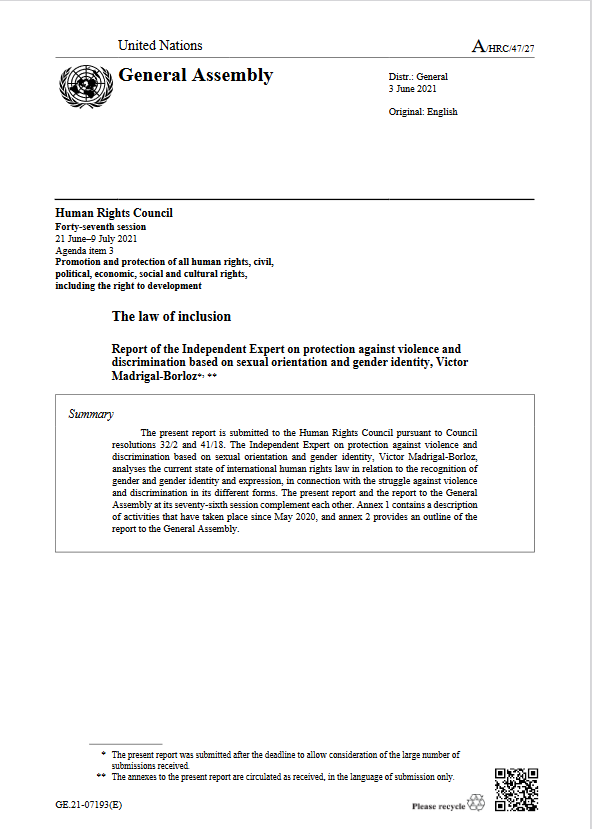2022 Report of the Independent Expert on SOGI: Law of Inclusion
Analysis of precedential value
The independent Expert on protection against violence and discrimination based on sexual orientation and gender identity (also known as IE SOGI) is a human right expert mandated to report and advise on this human right. This mandate was created by the UN Human Rights Council in June 2016 to address concern at acts of violence and discrimination committed against individuals because of their sexual orientation or gender identity. It was most recently renewed by the Human Rights Council in June 2022. Victor Madrigal-Borloz is the mandate holder who issued this report. This report constitutes an authoritative source of expert precedent for the meaning and significance of key language.
Used as precedent
intersectionality
“The observation of the Committee on Economic, Social and Cultural Rights about persons with disabilities being treated as genderless human rights and the observation by the Committee on the Rights of Persons with Disabilities that women with disabilities may be subject to multiple and intersectional forms of discrimination based on gender and disability are notable examples of how identities may be described as points of entry into an analysis of the provilege and discrimination that are created at the point of intersection of the multiple identities that every person encompasses in one body, including gender identity.” (paragraph 24)
“The understanding that intersectional analysis is fundamental to addressing violence and discrimination against women, including lesbian, bisexual and trans women, has permeated through public policy, and many State submissions acknowledged its importance.” (paragraph 26)
gender identity and expression
“Further, a broad understanding of gender allows for the systematic assessment of discrimination impacting persons because of their real or perceived sexual orientation, gender identity and/or expression, and the interpretation issued by United Nations human rights treaty bodies indeed suggest this conclusion as a consequence of gender-based analysis.” (paragraph 30)
bodily autonomy and integrity
“The relationship between bodily autonomy and the right to have one’s physical and mental integrity respected, and their inextricable connection with legal notions of agency, has been documented by the United Nations Population Fund (UNFPA) as being fundamental to the enjoyment of all other human rights, including the right to health as described by the Committee on Economic, Social and Cultural Rights:” the right to control one’s health and body, including sexual and reproductive freedom, and the right to be free from interference, such as the right to be free from torture, non-consensual medical treatment and experimentation”.” (paragraph 48)
negative legal determinants
“In his 2018 country visit to Georgia, the Independent Expert observed that a majority of the trans men he interviewed were missing their middel finger, and was subsequently shocked to learn that a medical authority entitled to certify a person as being a “true” trans person demanded that the said finger be amputated to create a prosthetic penis as part of the requirements for legal recognition.” (paragraph 50)
comprehensive sexuality education
“The provision and reception of comprehensive gender and sexuality education is legally protected under article 19 of the Universal Declaration of Human Rights and article 19 of the International Covenant on Civil and Political Rights.” (paragraph 54)
positive legal determinants
“Notably, the Constitutional Court of Colombia has established that gender identity and sexual orientation are aspects inherent in individuals which are part of their innermost selves, but which should be able to be fully externalized, and be recognized and respected.” (paragraph 65)
